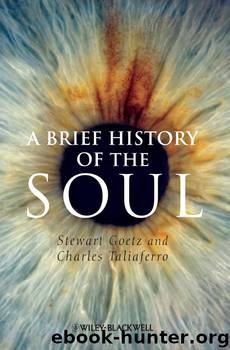A Brief History of the Soul by Stewart Goetz & Charles Taliaferro

Author:Stewart Goetz & Charles Taliaferro [Goetz, Stewart]
Language: eng
Format: azw3
ISBN: 9781444395921
Publisher: Wiley
Published: 2011-05-18T04:00:00+00:00
Reid
Thomas Reid (1710–1796), who, like Butler, was a man of the cloth, was also equally critical of Locke’s views of personal identity. For starters, Reid asserts that none of us could even reason about something like the existence and nature of the soul without the conviction of his or her personal identity:
We may observe, first of all, that [the conviction that every man has of his identity] is indispensably necessary to all exercise of reason. The operations of reason, whether in action or in speculation, are made up of successive parts. The antecedent are the foundation of the consequent, and, without the conviction that the antecedent have been seen or done by me, I could have no reason to proceed to the consequent, in any speculation, or in any active project whatever. (Reid 1872, I: Essays on the Intellectual Powers of Man, 344)
Having drawn our attention to the conviction that each of us has regarding his or her personal identity, Reid takes aim at Locke’s claim that the same consciousness (and thus, on Locke’s view, the same person or self) might be attached to more than one substance. Were this possible, two or more substances might remember the same past action or feeling, with the result that
two or twenty intelligent beings may be the same person. And if the intelligent being may lose the consciousness of the actions done by him, which surely is possible, then he is not the person that did those actions; so that one intelligent being may be two or twenty different persons, if he shall often lose the consciousness of his former actions. (Ibid., 351)
In Reid’s estimation, one—if not the—fundamental problem with Locke’s treatment of personal identity is his understanding of “consciousness.” At its heart, Locke’s account confuses consciousness, which is a current awareness of what is present, with memory, which is about past events:
Mr. Locke attributes to consciousness the conviction we have or our past actions, as if a man may now be conscious of what he did twenty years ago. It is impossible to understand the meaning of this, unless by consciousness be meant memory, the only faculty by which we have an immediate knowledge of our past actions. […] If a man can be conscious of what he did twenty years or twenty minutes ago, there is no use for memory, nor ought we to allow that there is any such faculty. The faculties of consciousness and memory are chiefly distinguished by this, that the first is an immediate knowledge of the present, the second an immediate knowledge of the past. (Ibid., 351)
While Reid’s central claim seems sound, we point out that it is neither the faculty of consciousness that provides immediate knowledge of what is present nor the faculty of memory that provides immediate knowledge of what is past, but the actualization or use of these faculties that provides what Reid describes. As Reid himself says about the faculty of smelling, “[t]he faculty of smelling is something very different from the
Download
This site does not store any files on its server. We only index and link to content provided by other sites. Please contact the content providers to delete copyright contents if any and email us, we'll remove relevant links or contents immediately.
| Anthropology | Archaeology |
| Philosophy | Politics & Government |
| Social Sciences | Sociology |
| Women's Studies |
The remains of the day by Kazuo Ishiguro(7551)
Tools of Titans by Timothy Ferriss(6950)
The Black Swan by Nassim Nicholas Taleb(6192)
Inner Engineering: A Yogi's Guide to Joy by Sadhguru(5897)
Giovanni's Room by James Baldwin(5879)
The Way of Zen by Alan W. Watts(5800)
The Six Wives Of Henry VIII (WOMEN IN HISTORY) by Fraser Antonia(4791)
The Power of Now: A Guide to Spiritual Enlightenment by Eckhart Tolle(4756)
Astrophysics for People in a Hurry by Neil DeGrasse Tyson(4620)
Asking the Right Questions: A Guide to Critical Thinking by M. Neil Browne & Stuart M. Keeley(4576)
12 Rules for Life by Jordan B. Peterson(3734)
The Ethical Slut by Janet W. Hardy(3504)
Skin in the Game by Nassim Nicholas Taleb(3462)
Housekeeping by Marilynne Robinson(3402)
The Art of Happiness by The Dalai Lama(3385)
Double Down (Diary of a Wimpy Kid Book 11) by Jeff Kinney(3275)
Skin in the Game: Hidden Asymmetries in Daily Life by Nassim Nicholas Taleb(3264)
Walking by Henry David Thoreau(3235)
12 Rules for Life: An Antidote to Chaos by Jordan B. Peterson(3204)
